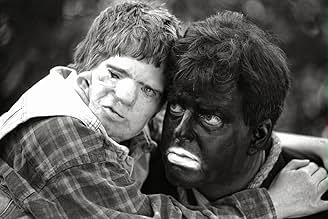Una desconcertante, desconcertante, surrealista y negramente cómica de la mente visionaria de Crispin Glover que narra las luchas interiores y exteriores de un joven que se enfrenta a villan... Leer todoUna desconcertante, desconcertante, surrealista y negramente cómica de la mente visionaria de Crispin Glover que narra las luchas interiores y exteriores de un joven que se enfrenta a villanos y demonios en múltiples planos.Una desconcertante, desconcertante, surrealista y negramente cómica de la mente visionaria de Crispin Glover que narra las luchas interiores y exteriores de un joven que se enfrenta a villanos y demonios en múltiples planos.
- Premios
- 2 premios ganados en total
- The young man
- (as Michael Bleviss)
- Dueling Demi-God Auteur
- (as Steven Stewart)
- …
- The minstrel's nemesis
- (as Rickey Wittman)
- Monkey Woman
- (as Zoreena Dreams)
- Dirección
- Guionista
- Todo el elenco y el equipo
- Producción, taquilla y más en IMDbPro
Opiniones destacadas
Honestly, though, i have only the most positive recollections of this film. As it doesn't seem to be available to take home and watch, i suppose i'll have to wait a few more years until Crispin Glover comes my way again with his Big Slide Show (and subsequent "What is it?" screening)... I saw this film in Atlanta almost directly after being involved in a rather devastating car crash, so i was slightly dazed at the time, which was perhaps a very good state of mind to watch the prophetic talking arthropods and the retards in the superhero costumes and godlike Glover in his appropriate burly-Q setting, scantily clad girlies rising out of the floor like a magnificent DADAist wet dream.
Is it a statement on Life As We Know It? Of course everyone EXPECTS art to be just that. I rather think that the truth is more evident in the absences and in the negative space. What you don't tell us is what we must deduce, but is far more valid than the lies that other people feed us day in and day out. Rather one "WHAT IS IT?" than 5000 movies like "Titanic" or "Sleepless in Seattle" (shudder, gag, groan).
Thank you, Mr. Glover (additionally a fun man to watch on screen or at his Big Slide Show-- smart, funny, quirky, and outrageously hot). Make more films, write more books, keep the nightmare alive.
Crispin Glover also said that he wanted to address taboo subjects. Well, he does do that. But why? The film seems to have no stance, no reason for addressing anything. Does he feel these things shouldn't be taboo? The film doesn't even give me an indicator of that. Taboo for the sake of taboo is not interesting. It can't even afford to make the taboo disturbing or inciting on any level because he hasn't made the audience care in any way.
Ignoring problems with the concept for a moment, the thing that actually shocked me most was how poorly the film was put together. The editing, cinematography, and other technical aspects seemed frequently to be extremely amateur. Glover said 125-150 thousand dollars went into the movie, and I feel that the money should have been spent on different designers (Glover actually did some design himself - I know I saw at least sound design in the credits). The painted sets are okay (not great), but used poorly. Parts feel like a photographed stage play - which would be fine if that went to any sort of purpose, but in Glover's hands it just feels sloppy. Other parts are filmed like a sort of Home Movie, of inferior quality to a lot of the stuff I see first-time filmmakers do on iMovie.
Perhaps the biggest problem with "What Is It?" is I can't even understand how seriously the film is to be taken. There are some parts that feel like Glover is screaming at you to think seriously. At other points, he seems off on his own little joke. Perhaps he meant for this to be ironic, or meaningful in some way, but I just felt that Glover couldn't even get himself to give his film any sort of serious attention.
Glover said he originally wanted it to be a short film. If only it had been. At seventy-two minutes, the film runs out of imagery and ideas in the first twenty, and it is arguable if the ideas were formulated enough to claim that they were even there for that period of time.
Profits are nowhere to be found in this low budget homage to Capra and Selznick. Hats off to to Glover for not pulling any punches whilst showing a decadent sequence involving a naked gentleman being ejaculated whilst laying inside a giant oyster. No expense - including excess pubic hair - has been spared.
On another note, I know what you must be thinking in the back of your mind: "wait, I think I have seen a graveyard sex scene before." Perhaps, but was it in the first five minutes? Did involve two fully clothed people with one too many chromosomes (each)? Crispin Glover proves that we have moved beyond the tired old traditions of repetitious childhood storytelling and myths and entered into a new realm wherein we are free to recreate and reimagine what it means to be a theater-going experience.
My long-time partner of two months, Brenda Velasquez, who recently left me, agrees with me. We might be like oil and water and sulfuric acid in the bedroom, but when the curtains go up, we are united before the grandeur of moviedom. Congratulations, Mr. Glover. We love your deliberately ratty film.
You get the sense that Glover doesn't mind that this is the case, and he'll almost as gladly listen to why someone hated the film as to why they enjoyed it. Glover's innate eagerness for and about his work and how audiences interpret it is strongly communicated not only through the film itself, but also through the unusual question and answer sessions that he frequently conducts following showings; he clearly hopes that people will continue to think about what he has presented.
The easiest way to interpret and dismiss the film is to label it as Dada or nihilist, a juvenile attack on the modern movie industry from an actor who's worked both without and within. But there's a reason why Glover performs his slideshow before showing his movie, and it's not only to sell books; his books juxtapose and create a narrative from images and text that Glover pieced together, and What Is It? does similarly with imagery drawn from Western culture.
What Is It? is an endearing and compelling film in ways one hardly expects while viewing. Much has already been made about Glover's use of actors with Down's syndrome, and indeed that is one of the most initially striking aspects of the film. So jarring, in fact, that many seem to interpret it as some sort of far-reaching crusade to see a more realistic and/or dignified portrayal of the disabled in movies and televisionor, on the absolute other end of the spectrum, as a kind of direct exploitation of the disabled. But it's not either, and maybe that's part of what makes this film so uncomfortable for many: the underlying agenda is not a political one or one of hatred, but one of looking beyond the mainstream culture into a kind of outsider ugliness. It's not a film about Down's syndrome, but it is a film that is owned by the actors with Down's syndrome who appear in it.
I'm the sort of person who is entirely gung-ho when it comes to ugliness and strangeness being portrayed so starkly that it is beautiful; happily for me, this is pretty much exactly how What Is It? presents itself to viewers. Glover uses the strange images of snails, death, and the disabled in part because he wants his audience to feel discomfort at either the sheer oddness of the imagery or the visceral reaction one has to the dying screams of an anthropomorphized snail. In some ways, the weirdly compelling (and occasionally downright grotesque) elements of What Is It? remind me of the work of the painter Francis Bacon he of the infamous popes, yes, and the odd distortions of the human figure that inevitably make viewers cringe and want to look away. Like Bacon's paintings, Glover's film manages to be opulent and humble, grainy and polished, chaotic and well-realized and the contradictions help to make it all the more disconcerting. But still this is not an entirely serious film, and it largely manages to sidestep the greatest pitfalls of pretension through the use of humor that, for the most part, derives from the use (and juxtaposition) of familiar items, images, and names of popular culture. And when What Is It? is funny, it is very funny.
Overall, What Is It? is an impressive first film from Glover as a director and writer, and his presence as an actor in the film proves not to be nearly the distraction one might expect it to be. Watching it is like being an observer in the kind of dream that isn't exactly good or bad, but just strange and that leaves you feeling slightly grimy when you wake up. If that's the kind of art you enjoy, What Is It? is likely to exceed your expectations and be well-worth the effort of catching it in the theatre, along with The Big Slide Show and Glover himself. All in all, it's an experience you're unlikely to forget any time soon.
¿Sabías que…?
- TriviaCrispin Glover's directorial debut.
- Citas
Dueling Demi-God Auteur and The young man's inner psyche: Good. He's dead. Now we can have a good time.
- Créditos curiososThis film has not advocated the assassination of Steven Spielberg in any way.
- ConexionesFeatured in Durch die Nacht mit...: Juliette Lewis und Crispin Glover (2010)
- Bandas sonorasSome Niggers Never Die (They Just Smell That Way)
by Johnny Rebel
Selecciones populares
- How long is What Is It??Con tecnología de Alexa
Detalles
- Tiempo de ejecución1 hora 12 minutos
- Color
Contribuir a esta página




















